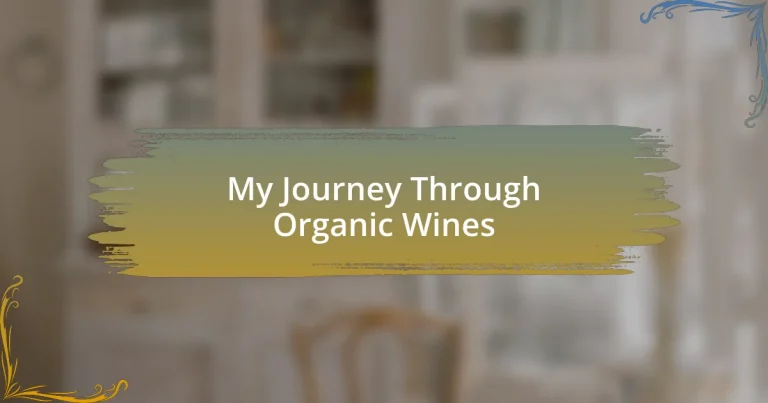Key takeaways:
- Organic wines are made without synthetic chemicals, enhancing flavor and environmental sustainability.
- Choosing organic can lead to fewer health issues associated with conventional wines, such as headaches.
- Visiting local organic wineries allows for a deeper appreciation of the winemaking process and connection to the land.
- Investigate winery practices and regional influences when selecting organic wines for a better experience.
Author: Clara Whitmore
Bio: Clara Whitmore is an acclaimed author and storyteller known for her captivating narratives and richly drawn characters. Her work spans several genres, including contemporary fiction and historical romance, often weaving elements of personal experience into her writing. Clara holds a Master’s degree in Creative Writing from the University of Edinburgh and has published three novels, which have garnered critical acclaim and a loyal readership. When she’s not writing, Clara enjoys exploring quaint bookstores and hosting literary workshops. She currently resides in Portland, Oregon, with her dog, Jasper.
Introduction to Organic Wines
When I first stumbled upon organic wines, it was like discovering a hidden treasure. I had always been curious about what lay behind the label, and the idea of wine made without synthetic chemicals resonated with me on a personal level. I remember savoring my first sip of an organic Merlot and feeling the earthiness that spoke of a more natural, less tampered approach to winemaking.
There’s something special about knowing the wines I enjoy are produced in a way that respects the environment. For instance, many organic vineyards adopt sustainable practices, like biodiversity and soil health, which enhances the quality of the grapes. Have you ever wondered how different wine might taste when it’s crafted with these principles in mind? That thought has certainly shaped my own exploration of organic wines.
As I delved deeper, I learned that the organic certification process ensures that no harmful pesticides or artificial fertilizers come into play. This dedication to purity often reflects the winemaker’s passion and commitment to quality. Feeling connected to the land and the community becomes a part of the experience, and it turns each bottle into more than just a drink; it transforms it into a story worth sharing.
Benefits of Organic Wines
When I first started exploring organic wines, I quickly noticed how they often exhibit a unique flavor profile. For example, one evening, I opened a bottle of organic Chardonnay that surprised me with its vibrant acidity and more pronounced fruit characteristics. This distinctiveness is largely due to the absence of synthetic additives, allowing the true essence of the grapes to shine through.
Beyond flavor, organic wines can be easier on the body. After experiencing headaches from conventional wines, I was intrigued to see if organic options made a difference. Once I switched, I discovered a noticeable reduction in those annoying morning-after symptoms. Isn’t it fascinating how what we consume can impact our well-being in such a direct way?
Moreover, knowing that my choice contributes to environmental sustainability brings me a sense of fulfillment. During a visit to an organic vineyard, I saw firsthand how practices like crop rotation and natural pest control promote biodiversity. It was inspiring to witness how choosing organic supports not only the quality of the wine but also a healthier planet. What could be more rewarding than enjoying a glass of wine that aligns with both my palate and my values?
Discovering Local Organic Wineries
As I began my journey into organic wines, I felt an overwhelming urge to explore local wineries. One sunny weekend, I decided to visit a quaint little vineyard just a few miles from my home. Walking through the rows of grapes, I marveled at the dedication of the winemakers and their commitment to organic practices; I felt an authentic connection to the land and its produce.
What struck me most during my visits was the personal touch each winemaker brought to their craft. At one family-owned winery, I was treated to a tasting session where the owners passionately shared stories of their harvest and the challenges they faced. Their enthusiasm was infectious; it was hard not to get excited about the wines crafted with such love and integrity. How often do we get to meet the very people behind the bottle we sip?
I remember savoring a small-batch organic Merlot that day, a wine crafted from grapes grown right on the estate. It amazed me how the expressions of the land—its soil, climate, and care—could translate so beautifully into the glass. Knowing I was enjoying something truly local, made with such attention to detail, added an unparalleled richness to the experience. Isn’t it amazing to think that every sip tells a story of dedication and place?
Tips for Selecting Organic Wines
When selecting organic wines, it’s essential to look beyond the label. While terms like “organic” and “biodynamic” are appealing, I’ve learned to investigate the winery’s practices as well. For instance, a few years ago, I stumbled upon a small vineyard that not only adhered to organic standards but also engaged in sustainable farming. Their commitment to the environment resonated with me, and it made the wine taste even better.
It’s also wise to consider the region where the wine is produced. I’ve found that certain areas naturally excel in organic farming due to their climate and soil. For example, wines from regions like Napa Valley or Sonoma County often exhibit a distinct character reflective of their terroir, which is the unique environment where the grapes are grown. Isn’t it fascinating how location can influence the taste of a wine?
Lastly, don’t hesitate to ask for recommendations from staff at local wine shops. Their expertise can guide you to hidden gems that you might overlook on your own. I remember a surprising encounter with a knowledgeable shopkeeper who introduced me to an exquisite organic Sauvignon Blanc that quickly became a favorite. It’s experiences like these that not only enhance your palate but also deepen your appreciation for the craft of organic winemaking.


